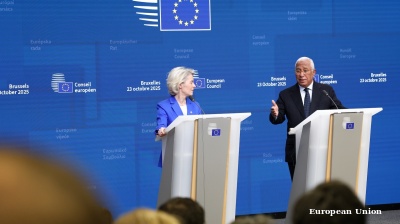France, the largest wheat exporter in the European Union, is facing the threat of a reduced agricultural output this year due to low rainfall and the risk of drought. The impact of a poor French harvest will ripple out across the world, driving food price inflation up and hurting food security in emerging markets.
“Given likely disruptions to wheat from Russia and Ukraine, which between them account for a quarter of global supply, and the serious droughts in the United States (15% of global supply) and Canada (13%), the news from France (10%) suggests that five of the world’s six largest exporters of wheat are simultaneously heading for large production declines,” D M Collingwood wrote recently in the Bournbrook blog.
Year-to-date rainfall in France has reached a historically low level of just over 200mm, which is only two-thirds of the median, according to the French meteorological service. This situation raises concerns about the country's grain harvest and the potential impact on food inflation.
France exports half of its annual wheat production of 35mn tonnes and is considered a reliable source of wheat in Europe, especially in light of disruptions caused by the conflict in Ukraine.
Additionally, India has experienced intense heatwaves, while China has been affected by COVID-related lockdowns and adverse weather conditions. These circumstances raise questions about whether these countries, home to nearly threebn people combined, will need to rely on imports, further straining global supply. China's wheat crop has already been reported as one of the worst in recent years.
The United Nations Food and Agriculture Organization had already raised concerns in mid-March about the potential for a global food crisis. The World Bank has forecasted a nearly 50% rise in wheat prices for 2022. While developed nations like Britain are unlikely to face starvation, higher food prices are expected to impact consumers, leading to inflationary pressures. In the UK, food inflation reached 4.3% in February, the highest in eight years, and continued to accelerate in the following months. Reliance on food banks in just the UK has risen an alarming 14% to 2.1mn between the start of 2022 and the end of March. On May 8, The Guardian revealed that the number of households cutting back on food or skipping meals in the UK had surged 57%, and that the number of 'food insecure' Britons had exploded from 4.7mn in January to 7.3mn.
The impact on emerging markets will be far worse. As bne IntelliNews reported, poor countries like Albania have already seen mass demostrations last year due to the soaring cost-of-living and Africa has already seen food riots as even the basics become unaffordable.
The deteriorating situation could be exacerbated by a collapse of the Black Sea grain deal that Russia’s is threatening to withdraw from after its demands to ease certain agricultural related sanctions were not met. At the same time the EU has banned exports of Ukrainian grain to Central European markets for five months adding to supply problems, after a glut of cheap Ukrainian wheat collapsed local prices earlier this year.
“So far grain traders have failed to react, and the price of wheat remains stable,” says Alexandra Prokopenko, a Russia analyst. “However, grain prices are very sensitive and there are several factors in the pipeline that could quickly drive prices up later this year.”
bneGREEN

North Macedonia's Skopje tackles mounting waste and rodent crisis
Locals say the problems in Skopje's Centar municipality worsened during the local election period when political campaigning took precedence over maintenance.

Malaysia–Vietnam offshore wind project to deliver 2,000 MW by 2034, strengthening regional green energy links
Malaysia’s upcoming offshore wind project connecting Vietnam to Peninsular Malaysia is expected to generate up to 2,000 megawatts (MW) of clean energy by 2034, marking a major step in the nation’s renewable energy expansion

EBRD invests €16.8mn in Croatia’s first large-scale battery storage and virtual power plant
Development bank to take its first equity stake in a standalone merchant storage project.

Kyrgyzstan says neighbours “upset” by country’s lack of water
“This year we were supposed to overcome shortages, but instead, they have intensified,” deputy head of cabinet tells Uzbekistan and Kazakhstan.




